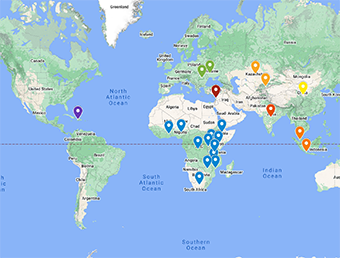
In order to support our mission for interdisciplinary work, CIRA's organizational structure is divided up into five sections or "Cores". Each of these cores provides a different type of support and service to a CIRA affiliate who is performing research.
- Administrative (Admin) Core
- Clinical and Health Services Research (CHSR) Core
- Development (Dev) Core
- Dissemination and Implementation Science Methods (DISM) Core
- Justice, Community Capacity, and Equity (JuCCE) Core
Reach out to the appropriate Core contact for further information.
Administrative (Admin) Core
Contact: Trace Kershaw, trace.kershaw@yale.edu
The Administrative Core provides overall leadership and management support to the Center, supports the work of all Cores, facilitates communication across cores and the broader CIRA community, conducts strategic planning to identify new scientific direction and stimulate interdisciplinary research collaborations, and monitors and evaluates the impact of the Center.
Core Aims:
- Establish and execute scientific and organizational direction and strategy.
- Provide fiscal and administrative oversight, coordination, and operations management.
- Lead network building of HIV researchers within and outside of Yale.
- Assess the effectiveness and impact of the Center and its individual cores.
Clinical and Health Services Research (CHSR) Core
Contact: Dini Harsono, dini.harsono@yale.edu
The Clinical and Health Services Research (CHSR) Core promotes multidisciplinary intervention research in diverse clinical settings that mitigates the impact of mental health disorders, substance use, and other HIV comorbidities and advances the uptake and efficacy of status neutral HIV care (i.e., HIV prevention and treatment services across the care continuum, regardless of one's HIV status).
Core Aims:
- Promote integrated services to address mental health, substance use with HIV-related services across clinical and non-clinical settings.
- Promote novel digital health-based approaches for fostering equitable research.
- Promote research on key structural determinants related to clinical health service implementation (e.g., forced displacement, mobility, clinic-level factors, incarceration).
Development (Dev) Core
Contact: Daniel Davidson, daniel.davidson@yale.edu
The Development Core stimulates and supports new HIV science and scientists through a variety of essential services that promote and facilitate research development and research careers.
Core Aims:
- Provide scientific resources to facilitate the development of innovative and impactful HIV equity research.
- Train, mentor, and guide early-career scholars to reduce HIV and academic inequities.
Dissemination and Implementation Science Methods (DISM) Core
Contact: Raul Hernandez-Ramirez, raul.hernandezramirez@yale.edu
The Dissemination and Implementation Science Methods (DISM) Core will expand scientific knowledge and develop, apply, and promote DISM in HIV research to improve status neutral HIV care (i.e., HIV prevention and treatment services across the continuum regardless of HIV status), especially among groups facing disparities, including individuals from historically marginalized populations based on sexuality, gender, and/or race and ethnicity, in New England, small urban areas, designated priority Ending the HIV Epidemic (EHE) locations, and globally, using best practices for impactful implementation science (IS) for EHE.
Core Aims:
- Provide expertise, consultations, and technical assistance on methods, design, and analysis for HIV Implementation Science.
- Develop and apply innovative research methods and technologies to maximize the impact of HIV equity research, emphasizing Implementation Science.
Justice, Community Capacity, and Equity (JuCCE) Core
Contact: Ijeoma Opara, ijeoma.opara@yale.edu
The Justice, Community Capacity and Equity (JuCCE) Core provides services that stimulate, promote and advance the conduct of innovative Community-Engaged Research (CEnR) by CIRA scientists and community research partners.
Core Aims:
- Promote collaborative academic-community partnerships.
- Develop capacity to use critical social science, and antiracist, anti-colonial, and anti-oppressive public health approaches.
- Promote research on key structural determinants related to social justice and health equity (e.g., racism, stigma).


